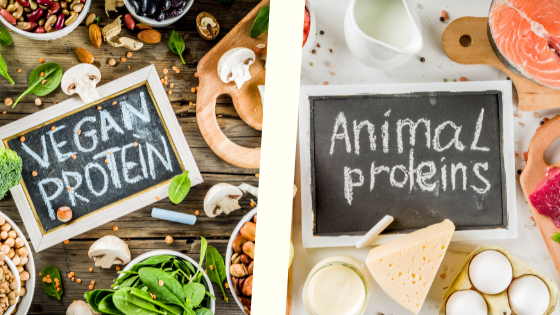


The debate over whether to eat a vegetarian or non-vegetarian diet has been going on for a long time for a variety of reasons. This article, on the other hand, concentrates on the benefits of each based on the type of protein they provide and its impact on our health.
When choosing a protein source, there are three major aspects to consider. Here’s a breakdown of each, as well as how animal and plant protein fit into each.
#1 Amino Acid Profile

Proteins are built up of amino acids, which aren’t all created equal; we require a variety of them since they all have distinct functions.
Our bodies can make some of these amino acids, but not all of them. The latter, known as ‘essential amino acids’ or EAAs, must be obtained from our diet in order to meet various body requirements; for example, an EAA called ‘leucine’ is required for our body’s post-workout muscle-building process, while another called ‘tryptophan’ is required for the production of serotonin, the hormone that causes feelings of happiness and well-being.
Animal and plant proteins differ primarily in their amino acid profiles, or the types of amino acids they supply.
Sources of Plant Protein:
Plant proteins generally lack one or more EEAs, although switching to various plant protein sources can compensate. For example, legumes supply the amino acid ‘lysine,’ which is deficient in many grains, whereas grains supply’methionine,’ which is deficient in legumes. As a result, vegetarians are advised to eat a range of protein sources on a regular basis.
Sources of Animal Protein:
Because animal proteins are so identical to us, they tend to provide all of the amino acids humans require.
Certain EAAs from animal protein (particularly a category of EAAs termed ‘branched chain amino acids,’ which includes leucine) enhance our lean muscle mass, which boosts our metabolic rate and aids weight reduction. These are particularly abundant in eggs and whey (a protein derived from milk), which is why they’re so popular among fitness buffs.
#2 The Quantity of protein our Body Consume

Distinctions in amino acid profiles between plant and animal sources even influence how much protein is consumed.
Sources of Plant Protein:
Protein derived from potatoes, beans, and oats is less easily digested than protein derived from animals. This is due of the presence of anti-nutrients (compounds that inhibit the absorption of other nutrients), which, in certain situations, can be minimized by the technique of preparation.
Plant-based proteins, on the other hand, have a biological value that is comparable to that of animal-based proteins when isolated from the source. Protein supplements such as soy protein isolate, pea protein concentrate, and wheat gluten include this. This type of protein is especially beneficial for vegans who may not always consume the recommended amount of protein.
Sources of animal protein:
Because human proteins are comparable to those of animals, ingesting animal sources of protein provides us with the amino acids in the required amounts. That’s why animal-based protein sources like meat,eggs and dairy are easily digested and absorbed by our bodies, where they’re used to make the proteins we require.
#3 Source of other nutrients

Plant Protein:
Plant protein-rich diets have been linked to improved cholesterol, blood pressure, and blood sugar levels.
This might be due to the large number of phytonutrients in the plants, which are health-promoting substances like antioxidants that combat free radical damage.
Animal Protein:
Animal protein meals provide a number of health benefits as well. Fish, for example, is high in omega-3 fatty acids, and frequent consumption has been associated to a lower risk of heart disease.
Vitamin B12, which is present in eggs, fish, and meats, is frequently insufficient in vegetarian diets. B12 is required for the proper functioning of our cells, particularly those in the brain and neurological system.
Questions about Plant and Animal Protein

While we analyze the amino acid profile and health advantages of protein sources, we need also consider the other nutrients and chemicals that come with the protein, which may or may not be healthy for us, because this protein package is likely to affect our overall health.
Here are a few things to keep an eye out for:
Animal Products from Factory Farms:
Another issue with commercially accessible meat is that factory farmed animal products may include leftover hormones and antibiotics. It’s still up for dispute if their amount is sufficient to make a substantial difference in our health.
Processed Meat:
Processed meat isn’t a suitable source of protein since it contains substances that aren’t found in fresh meat and can be hazardous to our health.
Carbs:
Because plant protein contains a significant number of carbohydrates (which must frequently be regulated), it’s vital to limit the amount of carb-rich meals while boosting plant protein consumption.
Lactose Senstivity:
Lactose, a sugar found in milk, is not suitable for everyone. Lactose intolerance is quite common in India, and the symptoms overlap with other gastrointestinal problems, making it difficult to diagnose.
If you use dairy products on a daily basis and have stomach problems, being tested for lactose intolerance may be beneficial. Lactose sensitive people should choose a whey protein isolate (which has nearly all of the lactose removed) or a plant protein.
Conclusion
Both forms of protein appear to provide a wide range of health advantages, according to the data.
By what we presently know, a diet heavy in plant protein with certain high-quality animal-based protein appears to be the optimum mix for maximum health.
Those who choose a vegetarian or vegan diet but find it difficult to acquire enough protein from food might use protein supplements.
Balance is crucial in nutrition, as it is in other things; it’s better to maintain your diet nutrient-dense by eating protein-rich meals from a variety of sources.
Ryan Fernando is an Award-winning celebrity Sports Nutritionist with 2GUINNESS world record and 2 Olympic medals under his belt. His client list include Olympic wrestler Sushil Kumar, cricketer Shikhar Dhawan & bollywood superstars Aamir Khan & Abhishek Bachchan. He is Chief Nutritionist at QUA Nutrition Signature Clinics.
©2023 All Rights Reserved Ryan Fernando. Designed and Developed by Floral Web Services